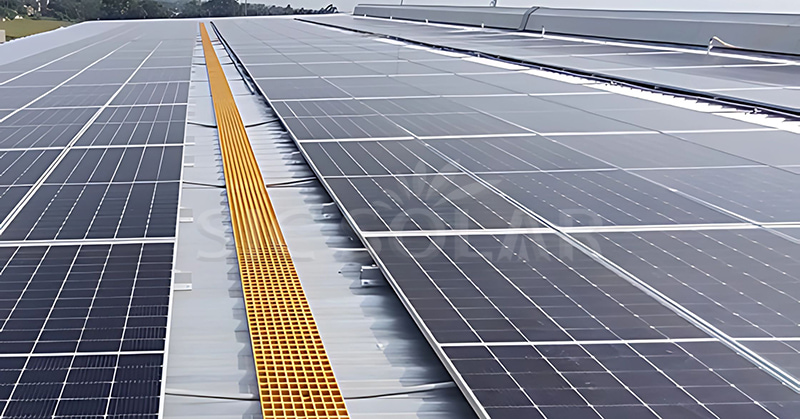When it comes to industrial and commercial infrastructure, safety and durability are top priorities. One solution that has gained widespread attention for its reliability and versatility is the FRP walkway. But what exactly is an FRP walkway, and why is it becoming a preferred choice across industries, including solar installations?

What Is an FRP Walkway?
FRP stands for Fiberglass Reinforced Plastic, a composite material made of a polymer matrix reinforced with fibers like glass. FRP walkways are modular platforms or paths designed to provide safe and stable access in environments where traditional materials like wood, steel, or concrete may fail due to corrosion, weight, or environmental factors.
FRP walkways are commonly used in industries such as oil and gas, chemical processing, and renewable energy, where exposure to harsh conditions is unavoidable. Their lightweight yet strong construction makes them a durable and cost-effective alternative to traditional materials.
Key Features and Benefits of FRP Walkways 1. Corrosion Resistance
One of the standout features of FRP walkways is their resistance to corrosion. Unlike metal or wood, FRP does not rust, rot, or degrade when exposed to moisture, chemicals, or UV radiation. This makes them ideal for outdoor applications, including solar installations, where prolonged exposure to the elements is a given.
2. Lightweight and Easy to Install
FRP is significantly lighter than traditional materials like steel or concrete, making it easier to transport and install. The modular nature of FRP walkways allows for quick assembly, reducing labor costs and installation time.
3. High Strength-to-Weight Ratio
Despite being lightweight, FRP walkways are incredibly strong and can withstand heavy loads. This makes them suitable for industrial environments that require robust infrastructure to support personnel and equipment.
4. Non-Slip Surface
Safety is a top concern in industrial settings, and FRP walkways are designed with anti-slip surfaces to minimize the risk of accidents, even in wet or oily conditions.
5. Low Maintenance
FRP walkways require minimal maintenance compared to traditional materials. Their durability and resistance to wear and tear mean they can provide long-term performance without the need for frequent repairs or replacements.
Applications of FRP Walkways
FRP walkways are versatile and can be used in a variety of settings, including:
- Industrial Facilities: To provide safe access to equipment, machinery, or elevated platforms.
- Chemical Plants: To withstand exposure to corrosive substances.
- Offshore Platforms: To endure harsh marine environments without compromising safety.
- Renewable Energy Sites: Particularly in solar farms, where walkways provide safe access for maintenance.
The Role of FRP Walkways in Solar Installations
Solar farms and rooftop solar installations often require walkways for safe access during maintenance or inspections. FRP walkways are an excellent choice for these applications due to their lightweight, non-corrosive properties.
For instance, in solar farms, where large-scale photovoltaic systems span vast areas, walkways must withstand environmental exposure while providing a stable surface for technicians. SIC Solar, a leading manufacturer of solar mounting systems, recognizes the importance of durable infrastructure in solar projects. By integrating FRP walkways with their mounting solutions, SIC Solar ensures that solar systems remain both accessible and secure for long-term operation.
Why Choose FRP Walkways for Your Project?
FRP walkways offer a combination of durability, safety, and cost-efficiency that traditional materials struggle to match. Their adaptability across various industries makes them a reliable choice for infrastructure projects requiring long-term performance.
In solar installations, where safety and reliability are crucial, the integration of FRP walkways with high-quality mounting systems like those from SIC Solar ensures that both panels and personnel are protected, even in challenging environments.
FRP walkways are a game-changing solution for industries that demand durable, lightweight, and low-maintenance infrastructure. Their corrosion resistance, high strength-to-weight ratio, and non-slip properties make them particularly well-suited for applications in renewable energy, including solar installations.
With companies like SIC Solar providing innovative mounting solutions, incorporating FRP walkways into solar projects becomes a seamless and effective way to enhance safety and accessibility. Whether you’re planning a large-scale solar farm or a rooftop installation, FRP walkways are a smart investment in the longevity and efficiency of your project.